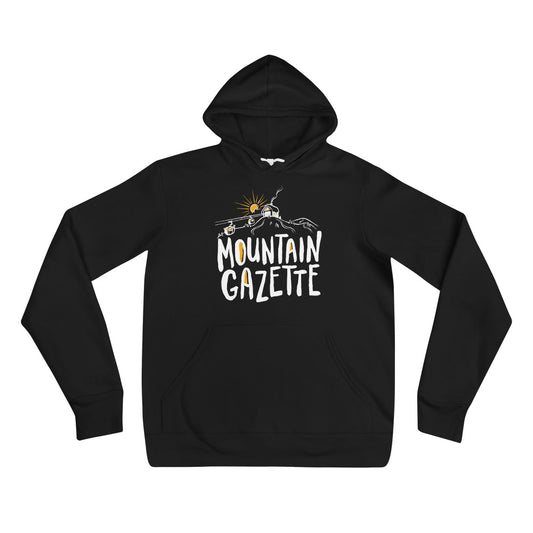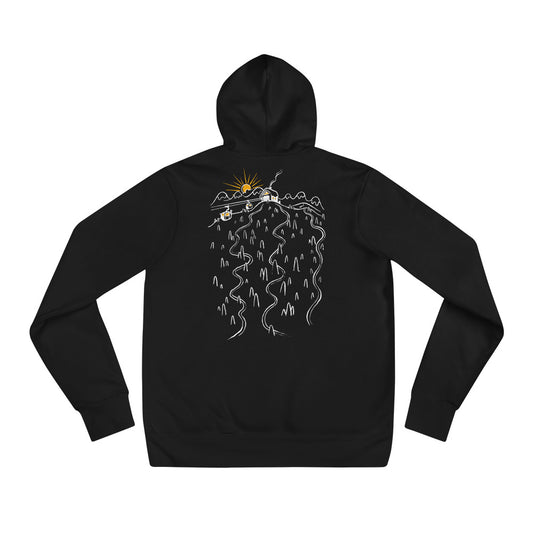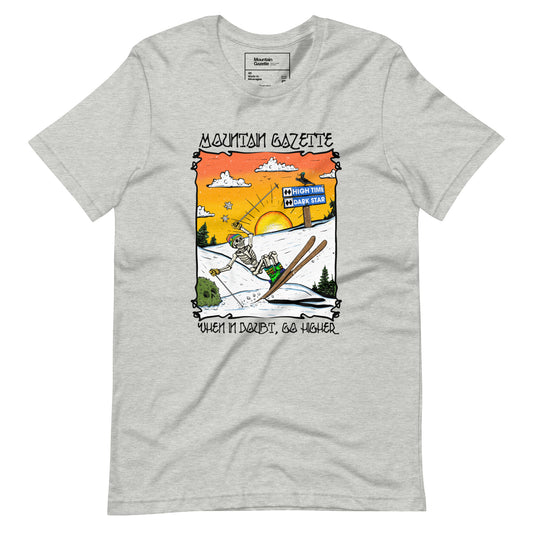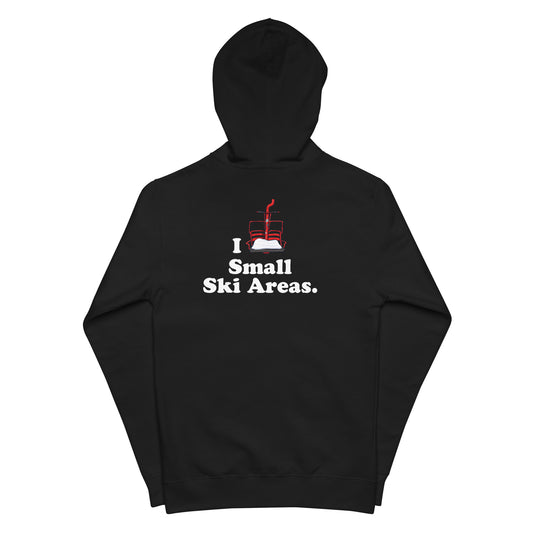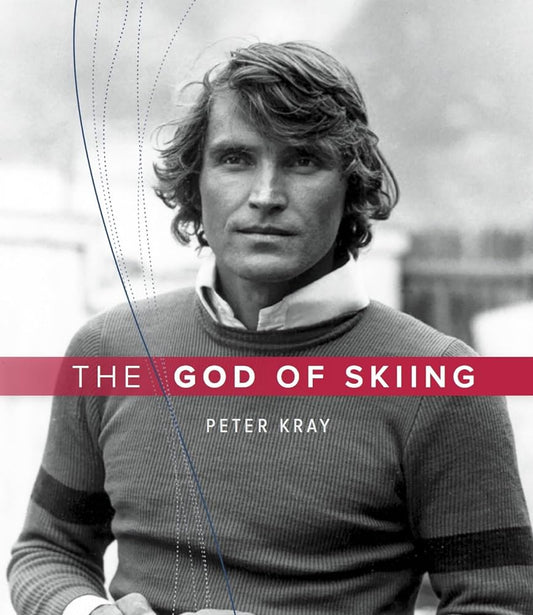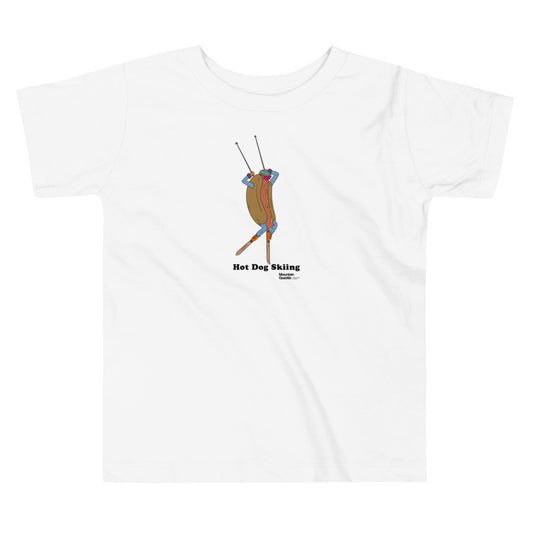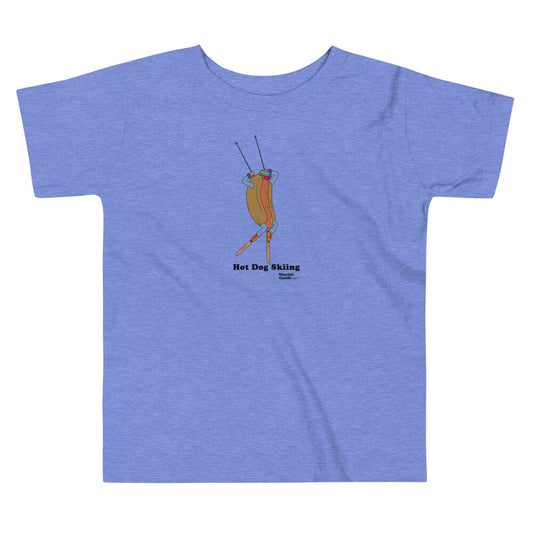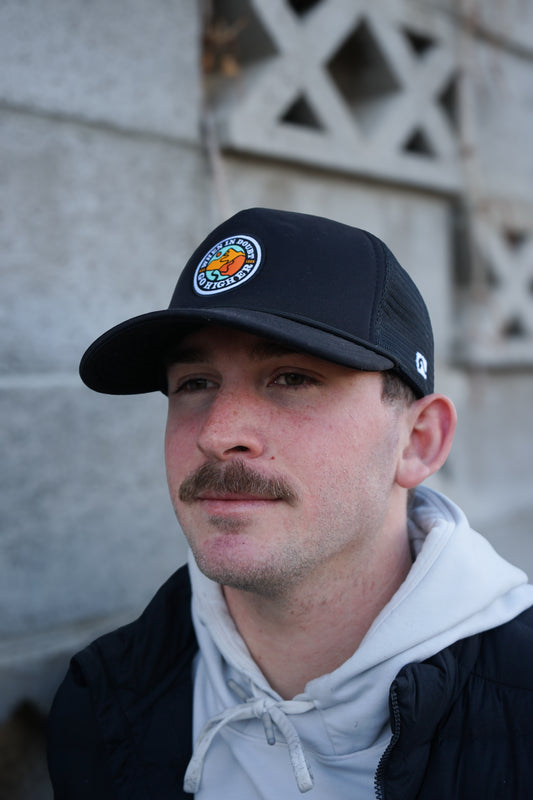
Writer & Anthropologist Michael Engelhard discusses his latest books, storied landscapes, and the little things that sustain him in a world with nature imperiled.
By Hannah Truby
On the Fairbanks outskirts and neighbored by lynxes and the occasional moose, Michael Engelhard’s cabin is reportedly without running water - but it does have signal, which allowed for a successful interview via video chat.
“I’ve got this love affair with Alaska and the Arctic. And also the Colorado Plateau,” Engelhard says on our call. “We've been moving back and forth every few years. I just can't seem to settle down.”
A trained anthropologist, veteran wilderness guide, and self-proclaimed privileged dirtbag, Engelhard is the author of three forthcoming wilderness-themed books set to publish this Spring: Arctic Traverse: A Thousand-Mile Summer of Trekking the Brooks Ranges, No Walk in the Park: Seeking Thrills, Eco-Wisdom, and Legacies in the Grand Canyon, and What the River Knows: Essays from the Heart of Alaska.
Before our video call, Engelhard wrote me an email. “I don’t know if you’re aware that 2024 marks the centennial of the first official wilderness area (in the Gila N.F., N.M.),” it read. “A whopping four decades before the Wilderness Act of 1964.”
I wasn’t aware, but a quick Google Search informed me that Gila was indeed the world’s first federally protected wilderness area, and 2024 was actually declared “The Year of the Gila Wilderness” by conservation groups, tribal nations, and the U.S. Forest Service. The Wilderness Act, I did know, established the National Wilderness Preservation System, a national network of more than 800 federally-designated wilderness areas. I was unsure as to how this related to Engelhard’s forthcoming books, but it was made clear early on in our call.
“For close to 30 years now, the idea of wilderness has been occupying my mind and my work,” he said. “From different angles, that's all I've ever really written about.”
Engelhard is a wild-enthusiast. In both his previous and forthcoming books, he admires and advocates for wild places, particularly those in the Alaskan Arctic and Colorado Plateau. Beyond mere accounts of bravado, Engelhard’s works offer glimpses into the heart and history of the places explored, and evoke questions of land use and permanence.
Across his published works (and our video chat), he quotes conservation forebears like Robert Marshall, Aldo Leopold, Henry David Thoreau, and Edward Abbey, as well as the Navajo and Hopi natives he has known throughout his education and travels.
But there seems to be something deeper in Engelhard’s writing than a mere healthy respect for nature and its elements. His fluency in the wild grants him a special perspective on his being there: a visitor, who’s been granted the opportunity to pass through beautiful and sacred places.
Continue reading for our Q&A with Michael Engelhard.
How did anthropology find you?
I traveled to the Southwest for the first time after doing a stint in the military. I ended up hitchhiking, really falling in love with the country, and staying with a Hopi family, and some Mexican fishermen off the coast of Yucatan. That led to an interest in anthropology. I applied for a scholarship for a year abroad, and attended the University of Alaska, in Fairbanks.
So, which came first: anthropology or writing? Have you always been a writer, or did your studies inspire that?
I'd never really set out to become a writer deliberately. In ‘98, I did a large project on 120 different canyons on the Colorado Plateau, because I read somewhere that that was the number of canyons that got affected when they dammed the Colorado River's Glen Canyon. It really stuck with me, that number. So I went out, studying the canyons for a year, and I took notes - mostly for myself - and I realized that, hey, it wasn't just the dam, it was other things impacting the land. We are still losing places on a daily basis from mining, grazing, development, and unfortunately, recreational use. Anyway, I hammered the whole thing into a manuscript and the rest, as they say, is history.
“Place names” play a big role in your books, and you provide readers with the original names of various mountains, canyons, and plains around the country. Why is the name of 'place' important?
There's an old adage that ‘naming is claiming’. The people that put the names on the map, or whose names survive on the maps, are the ones that lay claim to a place, but it goes way beyond that, because place names are really a repository of people's history and identity...
|
“Today, such linguistic time capsules entice dreamers with visionary topographies. In earlier days it was the absence of names that drew men eager to fill in blank spaces on their maps…[the Native] names defined homeland rather than wilderness…they endure as part of a moral universe, eloquent reminders that continue to shape the identities of groups and individuals.” - “What’s in a Name? Laying claim to Alaskan monikers” by Michael Engelhard |
Early on in my career, I accompanied Alaskan Natives on fishing and hunting excursions, I got to listen to their stories…and I got paid for it! [laughs]. But it helped me really understand their emphasis on place. When you know those original names of places and the stories that go with it, it really animates the landscape, it really brings it to life. I will have to sit down and write a whole book on place-names, at some point.
In your Author’s Note, you write, “The following pages owe much to the fact that nature, culture, and history have shaped each other ever since humans stepped into the scene. Ethnicity and economies merely provide varied conduits through which such energies flow.” I was really intrigued by this, can you expand on it?
I’m very interested in the systems that govern us - they very strongly shape the perception of place and how we interact with it. A capitalistic economy like our own creates artificial demands to create goods in the market, which draws on non-renewable resources. Today, new desires need to be created to sustain the economy.
‘Artificial demands’, meaning what, exactly?
In the outdoors recreation field, for example, there's always a new sport, you know? Where people go out and buy more gear; now, the latest fad is fat bikes you can ride in the snow, in the desert, Before it was stand-up paddleboards, you know. People want new things, more resources are used, and it really never ends.
Even this whole idea of green technologies and green development - it's still development, it's still rooted in consumerism, solar farms and wind farms, they still take up undeveloped spaces and develop them. And it’s not even an alternative yet, because people will still continue to rely on solar energy and still use fossil fuels and all the other products that come from the fossil fuel industry. And I think that’s starting at the wrong end.
Much of your writing centers around indigenous practices and traditions. What would you say is the biggest difference between an indigenous-approach to land management to our modern-day one?
When early settlers came, they didn’t see what the natives were doing as a proper system or economy. But it was, they operated under a subsistence economy; they managed the land with irrigation channels, starting brush fires to promote new growth, which benefited the animals that they were hunting, and so on. They have always been aware of a place’s carrying capacity, meaning that a place can only hold, feed, sustain so many people until it’s overused, or destroyed.
In Arctic Traverse, you often bring up the impending demise of wild spaces. Do you think we can take the necessary steps to help protect them, or will future generations be relegated to simply reading books and imagining what you and I once experienced?
I think the problem, really, is civilization, which doesn't really help us much, because what are we going to do about it? Where are we going to go? There may very well be a big crash, and while we can’t live like the Stone Age, we may find ourselves in a position where we have no choice but to make those changes, which would be much worse than making systemic changes now, voluntarily. Like I wrote in the book, if we can’t save the land, it cannot save us. Conservationists who have come before though have shown us viable flight paths.
How would you describe the balance between your deep appreciation for wild places and your cynicism about their future? What lessons/comforts stand out to you from your travels?
On a practical level, my travels keep reminding me to cherish the small things: flowers, moments, a jumping fish, or the shape of a cloud backlit by the sun. Too often, these are overlooked on the quest for "adventure." But in a world with nature imperiled, they sometimes are the only things that can still lift you up.
///
After our call, the kind of depressing reality of wild spaces weighed heavier than usual on me. When I went to write out this interview, I took a deeper look into the history of public spaces, and particularly the 1964 Wilderness Act.
At a time when Americans were enjoying the luxuries of an economic boom, they were also getting to enjoy the outdoors in a new way. Wildlife and fish populations were on the up. People home from wars were taking up recreation. But they also were witnessing new problems: the same economic boom that granted the freedom to hunt and fish and camp was now causing pollution, destroying rugged spaces into developed ones.
It’s been said that a desire to manage and conquer wild places is intrinsic in modern humans - but with this, I think, comes a desire to protect them. 1960 Americans were able to see that, left unchecked, development would hack away at the wild places they had come to enjoy. Teddy Roosevelt, among others, was concerned that, should the country be left without wildlands, it would surely slip into inferiority.
So, in the spirit of both conservation and patriotism, a new path via the Wilderness Act was forged (Love it or criticize it, you can’t say we don’t go big here in America. We go big and we want to be first to do it).
This was kind of nice to read, and things like the remarkable level of bipartisan support that the Great American Outdoors Act in 2020 is also comforting.
Though he is saddled with the realities of development, even Michael Engelhard doesn’t seem too dismayed.
He finished our call by saying, “It was nice chatting with you -- I hope I didn't ramble or chew your ear off. I still get excited like this, even after all this time.”
Arctic Traverse and No Walk in the Park are now available on Mountaineers Books and Amazon. What the River Knows is set for release June 1st.








